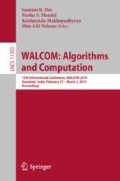Abstract
With the advent of quantum computers, researchers are exploring if quantum mechanics can be leveraged to solve important problems in ways that may provide advantages not possible with conventional or classical methods. A previous work by O’Malley and Vesselinov in 2016 briefly explored using a quantum annealing machine for solving linear least squares problems for real numbers. They suggested that it is best suited for binary and sparse versions of the problem. In our work, we propose a more compact way to represent variables using two’s and one’s complement on a quantum annealer. We then do an in-depth theoretical analysis of this approach, showing the conditions for which this method may be able to outperform the traditional classical methods for solving general linear least squares problems. Finally, based on our analysis and observations, we discuss potentially promising areas of further research where quantum annealing can be especially beneficial.
Access this chapter
Tax calculation will be finalised at checkout
Purchases are for personal use only
References
Quantum enhanced optimization (qeo). https://www.iarpa.gov/index.php/research-programs/qeo
Adachi, S.H., Henderson, M.P.: Application of quantum annealing to training of deep neural networks. arXiv preprint arXiv:1510.06356 (2015)
Aramon, M., Rosenberg, G., Miyazawa, T., Tamura, H., Katzgraber, H.G.: Physics-inspired optimization for constraint-satisfaction problems using a digital annealer. arXiv preprint arXiv:1806.08815 (2018)
Boixo, S., et al.: Evidence for quantum annealing with more than one hundred qubits. Nat. Phys. 10(3), 218 (2014)
Chang, X.W., Han, Q.: Solving box-constrained integer least squares problems. IEEE Trans. Wirel. Commun. 7(1), 277–287 (2008)
Do, Q.L.: Numerically efficient methods for solving least squares problems (2012)
Dorband, J.E.: Stochastic characteristics of qubits and qubit chains on the D-wave 2X. arXiv preprint arXiv:1606.05550 (2016)
Dorband, J.E.: A method of finding a lower energy solution to a QUBO/Ising objective function. arXiv preprint arXiv:1801.04849 (2018)
Drineas, P., Mahoney, M.W., Muthukrishnan, S., Sarlós, T.: Faster least squares approximation. Numer. math. 117(2), 219–249 (2011)
Grote, M.J., Huckle, T.: Parallel preconditioning with sparse approximate inverses. SIAM J. Sci. Comput. 18(3), 838–853 (1997)
Honjo, T., Inagaki, T., Inaba, K., Ikuta, T., Takesue, H.: Long-term stable operation of coherent Ising machine for cloud service. In: CLEO: Science and Innovations, pp. JTu2A-87. Optical Society of America (2018)
Kadowaki, T., Nishimori, H.: Quantum annealing in the transverse Ising model. Phys. Rev. E 58(5), 5355 (1998)
Karimi, K., et al.: Investigating the performance of an adiabatic quantum optimization processor. Quantum Inf. Process. 11(1), 77–88 (2012)
OGorman, B., Babbush, R., Perdomo-Ortiz, A., Aspuru-Guzik, A., Smelyanskiy, V.: Bayesian network structure learning using quantum annealing. Eur. Phys. J. Spec. Top. 224(1), 163–188 (2015)
O’Malley, D., Vesselinov, V.V.: ToQ. jl: A high-level programming language for D-wave machines based on Julia. In: 2016 IEEE High Performance Extreme Computing Conference (HPEC), pp. 1–7. IEEE (2016)
O’Malley, D., Vesselinov, V.V., Alexandrov, B.S., Alexandrov, L.B.: Nonnegative/binary matrix factorization with a D-wave quantum annealer. arXiv preprint arXiv:1704.01605 (2017)
Pilanci, M., Wainwright, M.J.: Iterative Hessian sketch: fast and accurate solution approximation for constrained least-squares. J. Mach. Learn. Res. 17(1), 1842–1879 (2016)
Tanaka, S., Tamura, R., Chakrabarti, B.K.: Quantum Spin Glasses, Annealing and Computation. Cambridge University Press, Cambridge (2017)
Tsakonas, E., Jaldén, J., Ottersten, B.: Robust binary least squares: relaxations and algorithms. In: 2011 IEEE International Conference on Acoustics, Speech and Signal Processing (ICASSP), pp. 3780–3783. IEEE (2011)
Walker, H.F., Ni, P.: Anderson acceleration for fixed-point iterations. SIAM J. Numer. Anal. 49(4), 1715–1735 (2011)
Wang, G.: Quantum algorithm for linear regression. Phys. Rev. A 96(1), 012335 (2017)
Acknowledgement
The authors would like to thank Daniel O’Malley from LANL for his feedback. A special thanks to John Dorband, whose suggestions inspired the development the one’s/two’s complement encoding. Finally, the authors would like to thank Milton Halem of UMBC and D-wave Systems for providing access to their machines.
Author information
Authors and Affiliations
Corresponding author
Editor information
Editors and Affiliations
Rights and permissions
Copyright information
© 2019 Springer Nature Switzerland AG
About this paper
Cite this paper
Borle, A., Lomonaco, S.J. (2019). Analyzing the Quantum Annealing Approach for Solving Linear Least Squares Problems. In: Das, G., Mandal, P., Mukhopadhyaya, K., Nakano, Si. (eds) WALCOM: Algorithms and Computation. WALCOM 2019. Lecture Notes in Computer Science(), vol 11355. Springer, Cham. https://doi.org/10.1007/978-3-030-10564-8_23
Download citation
DOI: https://doi.org/10.1007/978-3-030-10564-8_23
Published:
Publisher Name: Springer, Cham
Print ISBN: 978-3-030-10563-1
Online ISBN: 978-3-030-10564-8
eBook Packages: Computer ScienceComputer Science (R0)

